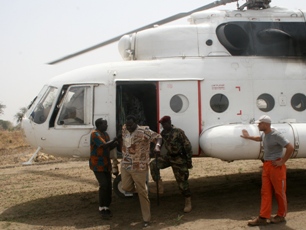Sudan’s Machar confirms 57 people died in Malakal fighting
By James Gatdet Dak
February 27, 2009 (JUBA) – About 57 people were confirmed dead in the Tuesday’s bloody clashes involving the Sudan Armed Forces (SAF) and the Sudan People’s Liberation Army (SPLA) in the Upper Nile state’s capital, Malakal.
 In a press statement on Friday shortly after his arrival in Juba from Malakal, the Vice President of the Government of Southern Sudan, Riek Machar Teny, said among the people killed included 26 civilians, 15 SPLA soldiers and 16 SAF soldiers.
In a press statement on Friday shortly after his arrival in Juba from Malakal, the Vice President of the Government of Southern Sudan, Riek Machar Teny, said among the people killed included 26 civilians, 15 SPLA soldiers and 16 SAF soldiers.
The wounded, he said, included 21 civilians, 40 SPLA soldiers and 33 SAF soldiers, bringing the total wounded to 84.
Machar stayed in Malakal town for three days, inspecting the town and assuring the citizens that the violence stopped and calm returned to the town. By Thursday shops were re-opened and civilians started moving in the town as normal.
The UN said today that Malakal violence resulted in about 50 deaths from the troops of both sides as well as civilians. Also there are some 100 wounded people.
The deadly fighting erupted on Tuesday one day after a surprising arrival of a wanted General to Malakal from Khartoum. An order to arrest General Gabriel Tang Ginye had been issued by the President of the Government of Southern Sudan, General Salva Kiir Mayardit since 2006.
General Tang, who is wanted by the Government of Southern Sudan for causing the November 2006’s clashes in Malakal which left about 150 people dead, is a military general formerly identified with the Other Armed Groups (OAGs) in the country.
He has been integrated into the Sudan Armed Forces for the last three years.
Machar explained that General Tang, who arrived in the town on 23rd February, defied the SPLA and UNMIS commanders who tried to persuade him to leave the town, resulting to clashes on the following day.
He said the incidence occurred on Tuesday while the Presidency was meeting in Juba, prompting him to urgently travel to Malakal instead of Juba from Khartoum on the same day to arrest the situation so that it did not escalate.
Machar who co-chairs the Joint Political Executive Committee between the two Naivasha peace partners went to Khartoum on Sunday to resolve a number of outstanding issues in the implementation of the peace deal.
He further explained that the Malakal fighting which started in the morning hours raged on for the whole day and stopped only after he arrived in the town in the evening where he moved between the two forces telling them to ceasefire.
“So I decided instead of coming [to Juba], is best to go where the problem is [Malakal],” he said.
“It took us sometime, that day we arrived around 6:15 (PM) and we straight went to meet first the SPLA commanders who were around the airport. From there we went to where General Tang was with the JIU (SAF) and persuaded him to leave so that there would be ceasefire. And by then there was still fighting, so we persuaded him, he left. After that we began to move in the twilight and in the night between the two forces so that there is ceasefire,” Machar further narrated.
He said the ceasefire was observed, but the following morning looting of property ensued in the town which was later stopped through the intervention of the United Nations peacekeepers and the Ceasefire Joint Monitoring Committee (CJMC).
“The next day some looting occurred. We had no force even to separate the forces [SPLA & SAF]. CJMC and UN forces managed to separate them. Since that time the town has become quiet” he explained.
The Vice President said he also traveled to Faluj oil field in Malut County north of Malakal town for the second time since Tuesday to resolve tensions that resulted from similar clashes which occurred hours after the Malakal incidence.
Meanwhile the President of the Government of Southern Sudan, General Salva Kiir Mayardit, has constituted an investigation committee to be headed by the Minister of Cabinet Affairs, Dr. Luka Tombekana Monoja, to investigate the causes of the Malakal incidence.
The committee shall report back to the President office within one month.
(ST)
